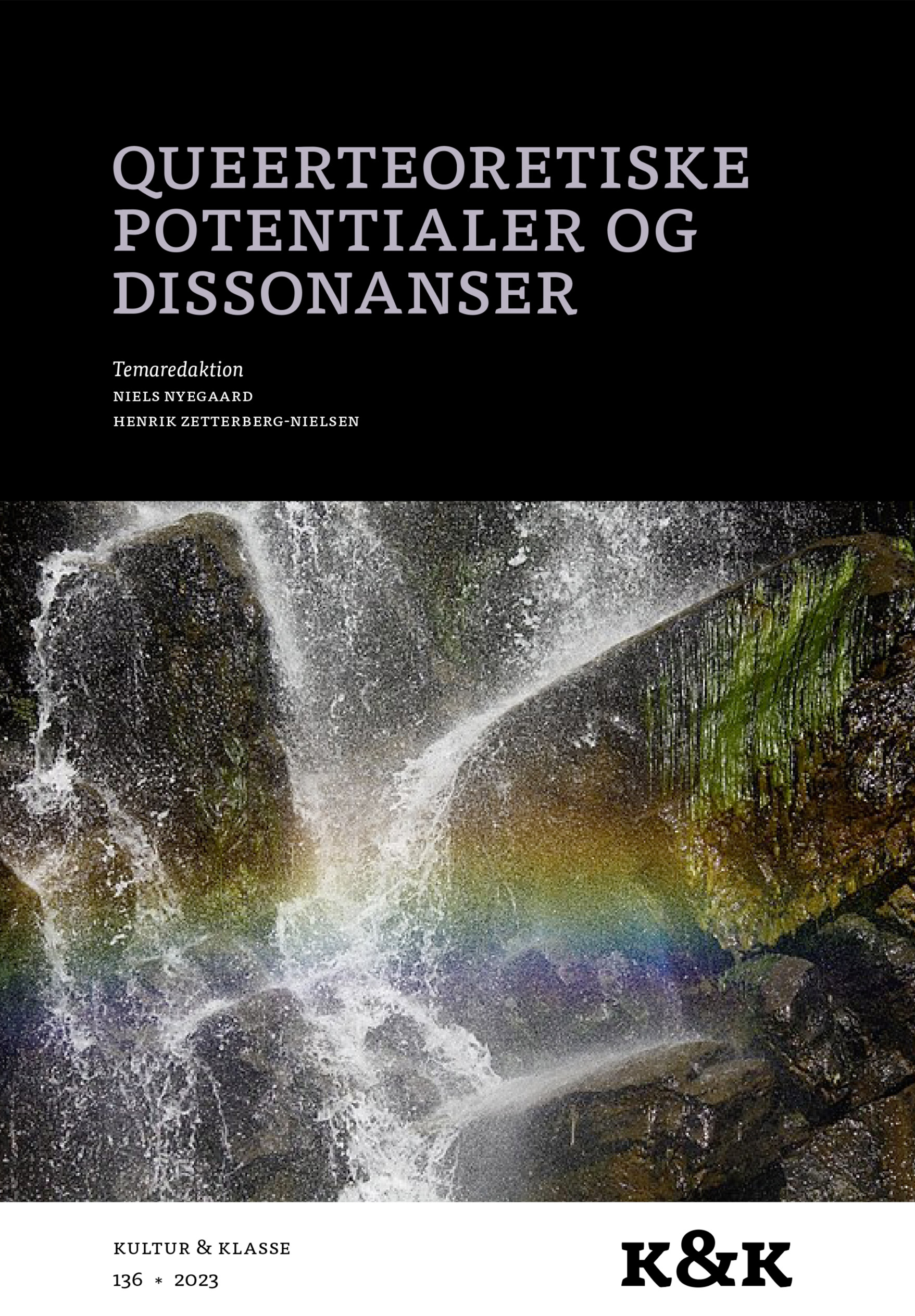De fyrstefødte og fyrsteløse
En queerteoretisk læsning af Cecilie Ekens Karanagalaksen
DOI:
https://doi.org/10.7146/kok.v51i136.143210Nøgleord:
Queerteori, børnelitteratur, science fiction, den heteroseksuelle matrice, kvindelig maskulinitet, kritisk maskulinitetsforskning, dekonstruktionResumé
With a deconstructive method and theoretical starting point in Raewyn Connell’s theory of masculinity as well as various queer theoretical perspectives, this article examines the gender-critical potential of Cecilie Eken’s science-fiction trilogy for children The Karana Galaxy (2018-2019). The thematic interpretation points to an unraveling of conventional gender perceptions in which diversity triumphs over conformity. But does the text indeed break with heteronormative assumptions, or are the descriptions of gender and sexuality (or the lack thereof) more like a modified version of gender binarism? The analysis shows that The Karana Galaxy both transcends and respects the logics of the heterosexual matrix. At the surface level of the text, the genders in the galaxy are defined by compulsory heterosexuality. At the same time, the text’s depiction of female masculinity breaks with these logics. Thus, the text can be interpreted as a homoerotic love relationship between a man and a masculine woman. However, the text’s bid to portray alternative forms of gender identities seems to contradict such a reading. Overall, the article therefore concludes that although the conventional understanding of masculinity and femininity is modified in The Karana Galaxy, the text’s constructions of gender and sexuality are still shaped by binary logics.
Referencer
Abate, Ann og Kenneth B. Kidd, red. Over the Rainbow: Queer Children’s and Young Adult Literature. The University of Michigan Press, 2004.
Austin, J. L. How to Do Things with Words. Oxford University Press, 1962.
Bissenbakker, Mons. Begreb om begær: Queeringer af nyere dansk litteratur. Syddansk Universitetsforlag, 2005.
Butler, Judith. Bodies That Matter: On the Discursive Limits of ’Sex’. Routledge, 1993.
Butler, Judith. Gender Trouble: Feminism and the Subversion of Identity. Routledge, 1990.
Butler, Judith. ”Critically Queer.” GLQ: A Journal of Lesbian and Gay Studies, vol. 1, nr. 1, 1993, s. 17-32.
Christensen, Nina og Mia Österlund. ”Mangfoldige former: Aktuel nordisk børne- og ungdomslitteratur i et kønsperspektiv.” Nordisk kvindelitteraturhistorie: Over alle grænser 1990-2015, redigeret af Anne-Marie Mai, Syddansk Universitetsforlag, 2017, s. 113-126.
Connell, Raewyn. Masculinities. 2. udg., Polity Press, 2005.
Liversage, Toni og Søren Vinterberg. Børn, litteratur, samfundskritik: Artikler om børnelitteratur i klassesamfundet. Munksgaard, 1975.
de Man, Paul. Blindness and Insight: Essays in the Rhetoric of Contemporary Criticism. 2. udg., Routledge, 1983.
Eken, Cecilie. Karanagalaksen III: Forbund. Høst, 2019.
Eken, Cecilie. Karanagalaksen Log I: Styrke. Høst, 2018.
Eken, Cecilie. Karanagalaksen Log II: Tillid. Høst, 2018.
Flanagan, Victoria. ”Gender studies.” The Routledge Companion to Children’s Literature, redigeret af David Rudd, Routledge, 2010, s. 26-38.
Flanagan, Victoria. Into the Closet: Cross-Dressing and the Gendered Body in Children’s Literature and Film. Routledge, 2007.
Franck, Mia. Frigjord oskuld: Heterosexuellt mognadsimperativ i svensk ungdomsroman. Åbo Akademisk Forlag, 2009.
Guin, Ursula K. Le. ”Is Gender Necessary? Redux.” The Language of the Night: Essays on Fantasy and Science Fiction, Harper-Collins Publishers, 1988, s. 155-172.
Halberstam, Jack. Female Masculinity. Duke University Press, 1998.
Haraway, Donna. ”A Cyborg Manifesto: Science, Technology, and Socialist-Feminism in the Late Twentieth Century.” Socialist Review, nr. 80, 1985, s. 65-108.
Heede, Dag. Det umenneskelige: Analyser af seksualitet, køn og identitet hos Karen Blixen. Odense Universitetsforlag, 2001.
Heede, Dag. Herman Bang - mærkværdige læsninger: Toogfirs tableauer. Syddansk Universitetsforlag, 2003.
Heede, Dag. Hjertebrødre: Krigen om H.C. Andersens seksualitet. Syddansk Universitetsforlag, 2005.
Hearn, Jeff. ”From Hegemonic Masculinity to the Hegemony of Men.” Feminist Theory, vol. 5, nr. 1, 2004, s. 49-72
Jensen, Lone Birch og Charlotte Hizner. ”Cecilie Eken.” forfatterweb.dk, november 2018, https://forfatterweb.dk/oversigt/eken00. Tilgået d. 8. august 2023.
Johnson, Barbara. ”At undervise dekonstruktivt.” Dekonstruktion, redigeret af Jacob Bøggild et al., Aarhus Universitetsforlag, 2004, s. 31-46.
Kidd, Kenneth B. Making American Boys: Boyology and the Feral Tale. University of Minnesota Press, 2004.
Kidd, Kenneth B. og Derrit Mason, red. Queer as Camp: Essays on Summer, Style, and Sexuality. Fordham University Press, 2019.
LGBT+ Danmark. ”Ordbog.” lgbt.dk, 2023, https://lgbt.dk/ordbog/. Tilgået d. 12. marts 2023.
Linhart, Silje Hernæs. Skam og andre følelser rundt transidentitet i litteratur for barn og ungdom. Norsk Barnebokinstitutt, 2016.
Lykke, Nina. Kønsforskning: En guide til feministisk teori, metodologi og skrift. Samfundslitteratur, 2008.
Rubin, Gayle. ”Thinking Sex.” Pleasure and Danger: Exploring Female Sexuality, redigeret af Carole S. Vance, Routledge, 1984, s. 267-319.
Skyggebjerg, Anna Karlskov. ”En bestået styrkeprøve.” Weekendavisen, 19. december 2019, https://www.weekendavisen.dk/2019-51/boeger/en-bestaaet-styrkeproeve. Tilgået d. 10. februar 2023.
Stephens, John, red. Ways of Being Male: Representing Masculinities in Children’s Literature and Film. Psychology Press, 2002.
Warner, Michael. ”Introduction.” Fear of a Queer Planet: Queer Politics and Social Theory, redigeret af Michael Warner, University of Minnesota Press, 1993, s. vii-xxxi.
Warner, Michael. The Trouble with Normal: Sex, Politics, and the Ethics of Queer Life. Harvard University Press, 1999.
Österholm, Maria Margareta. Ett flicklaboratorium i valda bitar: Skeva flickor i svenskspråkig prosa från 1980 till 2005. Rosenlarv förlag, 2012.
Österlund, Maria. Förklädda flickor: Könsöverskridning i 1980-talets svenska ungdomsroman. Åbo Akademis Forlag, 2005.
Downloads
Publiceret
Citation/Eksport
Nummer
Sektion
Licens
Tidsskriftet følger dansk ophavsret.





